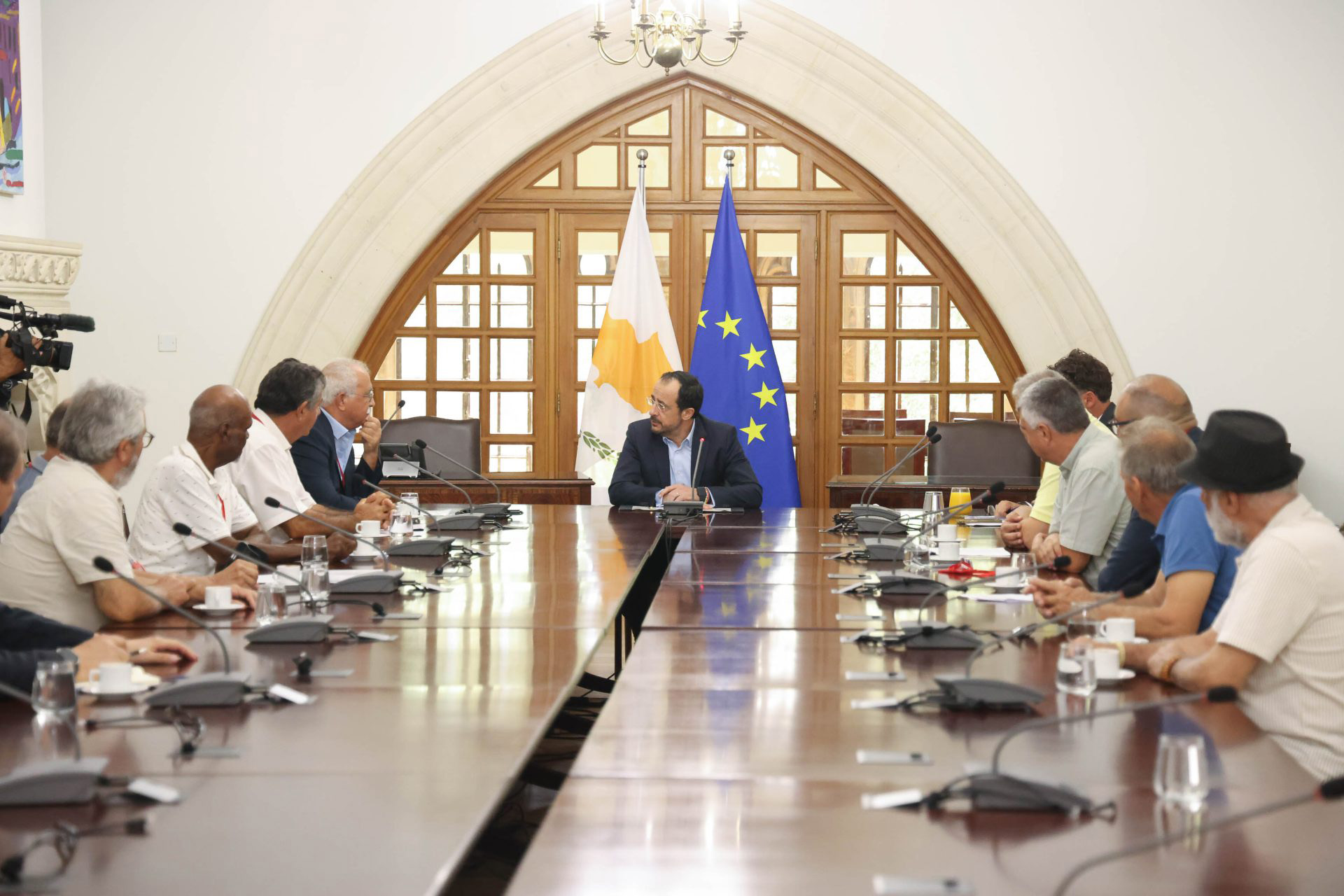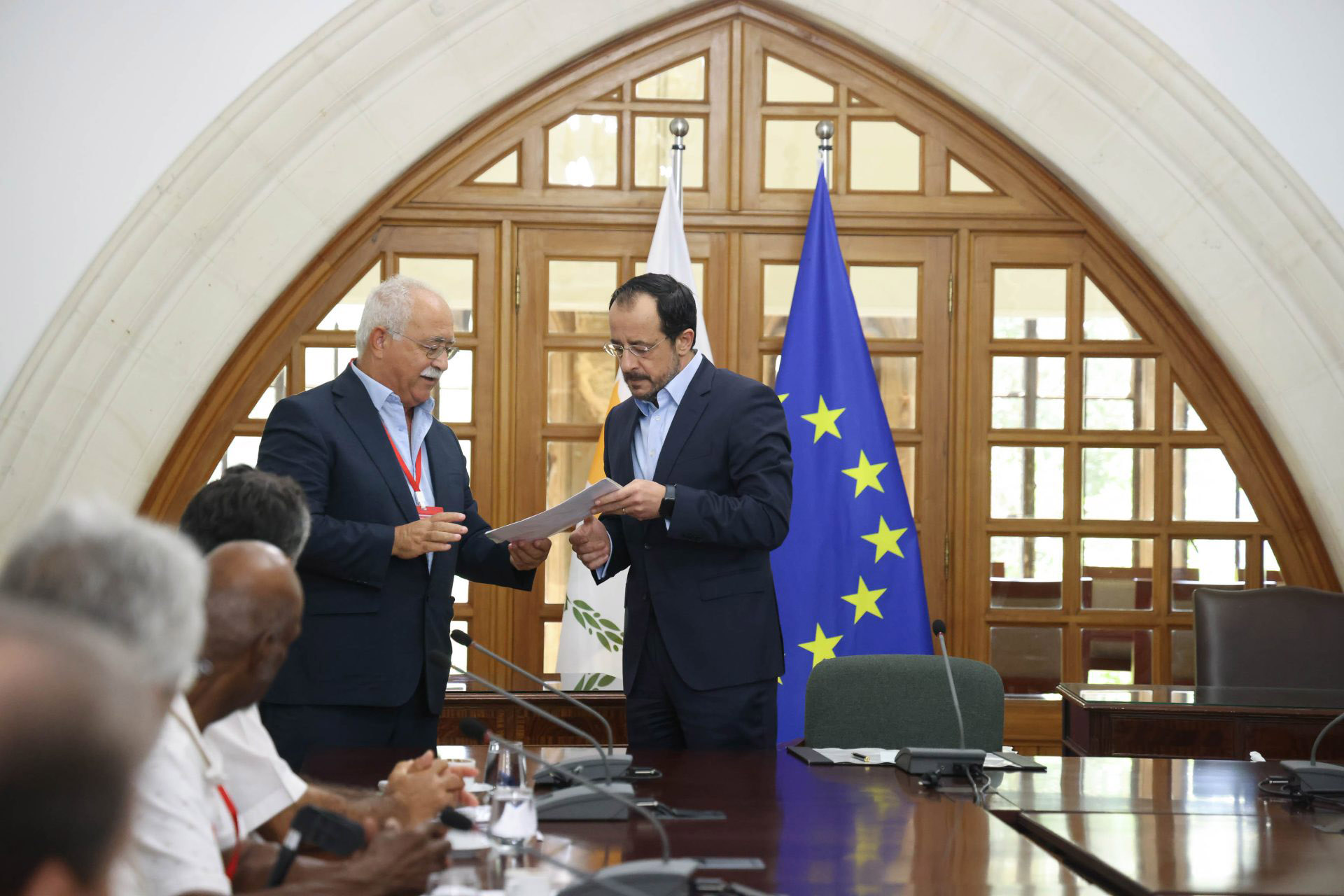President Nikos Christodoulides on Thursday met a selection of Turkish Cypriots at the presidential palace to “exchange views” ahead of next week’s enlarged meeting on the Cyprus problem, which is set to take place in New York.
The group included the leaders of minor Turkish Cypriot political parties, the YKP’s Murat Kanatli and the BKP’s Izzet Izcan, among others.
Presidential press office director Victor Papadopoulos said after the meeting that Christodoulides had “assured” the group that “he remains steadfast on the matter of a bizonal, bicommunal federation and will do his utmost to ensure a return to the negotiating table”.
Those negotiations, he added, will be held “on the basis of the agreed framework and within the scope of the United Nations’ resolutions”.
He said Christodoulides had “listened to various concerns” raised by the delegation, and “promised that he will address these problems to the extent that the Republic of Cyprus can assist in these matters”.
Additionally, he made reference to the 14 unilateral confidence-building measures announced by Christodoulides in January last year, and said the Turkish Cypriot delegation will be sent a copy of an internal progress report written by the government regarding their implementation.
One of those measures was a lifting of the block of Turkish Cypriots born in Cyprus with one foreign-born parent from acquiring citizenship of the Republic of Cyprus, though even since then, for many people in such situations, their applications for citizenship have not been successful, and many have not even been examined.
Papadopoulos then spoke on the matter of next week’s enlarged meeting, saying, “in New York, the greatest aspiration is to resume talks”.
“If this is not possible, though this is the president’s aspiration and the aim towards which he is working, which he also makes during all the meetings he has with everyone involved, then the immediate next best aspiration is to take steps towards the resumption of talks,” he added.
He went on to say that the Greek Cypriot side is “making every effort so that the six issues agreed upon in Geneva” at the previous enlarged meeting in March “re implemented”.
“In this direction, we have made many proposals to overcome any problems or complaints from the Turkish side,” he said, adding that Christodoulides has “also made additional proposals”.
“We are constantly trying to achieve the implementation of what we committed ourselves to before the UN secretary-general [Antonio Guterres] … If progress is not achieved on any of those issues, it is not our side’s fault.”
At the meeting, the Turkish Cypriot delegation submitted a letter to Christodoulides expressing concerns about the north’s growing population. Izzet Izcan read the letter’s contents to journalists after the meeting’s conclusion.
“We believe that the population issue in the north of our island, which threatens the existence of the Republic of Cyprus and closely concerns the Turkish Cypriot community, is a major obstacle to the resolution of the Cyprus problem,” he began.
“Turkey, which intervened militarily on the island under the pretext of ‘guarantor responsibility’ to protect the territorial integrity of the Republic of Cyprus and re-establish its constitutional order, has exceeded its guarantor responsibilities [and] carried out ethnic cleansing in the north of Cyprus.”

He added that Turkey has “divided the island into two with a border, looted the property of Greek Cypriots, and … has transported populations to the island, disrupting the demographic structure and establishing a separatist, puppet political regime loyal to itself”.
He highlighted the discrepancy between the number of Turkish Cypriots eligible to vote at last year’s European Parliament elections – around 103,000 – and the number of people eligible to vote at this October’s Turkish Cypriot elections, which currently stands at around 215,000.
With this in mind, he said that after October’s elections, “Turkey, not Turkish Cypriots, will be represented” at the negotiating table.
He thus requested that Christodoulides “bring the issue of Turkey systematically transferring population to the north of our island … and changing the demographic structure, to the European Union, the United Nations and the Council of Europe, and file a complaint with the International Criminal Court at the Hague”.
He also asked that Christodoulides “formally demand from the UN” that an independent census be carried out in the north “with the supervision of international observers”.
“This census must be carefully designed and implemented to accurately determine the actual number of Turkish Cypriots who are citizens of the Republic of Cyprus and, most importantly, to definitively identify the number and identities of illegal settlers,” he said.
He added, “we consider the political population transfer imposed by Turkey to be a violation of the political will of Turkish Cypriots and a disrespect for democracy and human rights”.
“The occupation of Northern Cyprus by Turkey and its designation as a sub-administration of Turkey by the European Court of Human Rights, has made the intervention of Turkish military and civilian bureaucrats in elections a regular occurrence during every election period,” he said.
“It is not possible for the Turkish Cypriot community to hold healthy elections in such a political environment where there is no democracy and where they are reduced to a minority in terms of the number of voters.”
“We request that you take action to ensure that healthy elections can be held in the north of Cyprus, organised and controlled by the UN.”
He then called on Christodoulides to “take action to end this dangerous electoral game, which serves Turkey’s separatist, colonialist policy and eliminates the political leadership of the Turkish Cypriots”.
He added that it is “in Turkey’s interest” for the results of Turkish Cypriot elections not to be questioned, and as such said he requested that Christodoulides “question the results of these fraudulent elections, in order to protect the sovereignty of the Republic of Cyprus and guarantee the democratic rights of its citizens”.
“Such a political stance will overcome the impasse in the settlement talks and prevent population transfer,” he said.






Click here to change your cookie preferences